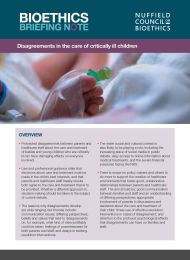Disagreements in the care of critically ill children
Policy Briefing
Published 03/04/2019

Overview
Protracted disagreements between parents and healthcare staff about the care and treatment of babies and young children who are critically ill can have damaging effects for everyone involved.
- Professional guidance and law state that decisions about children’s care and treatment must be made in the child’s best interests, and that parents and healthcare staff ideally should both agree to the care and treatment that is to be provided. Whether a different approach to decision making should be taken is the subject of current debate.
- The reasons why disagreements develop are wide ranging, but common themes include: communication issues; differing perspectives, beliefs and values that lead to disagreements on, for example, what kind of risks justifiably could be taken; feelings of powerlessness for both parents and staff; and delays in seeking resolution interventions.
- The wider social and cultural context is also likely to be playing a role, including the increasing place of social media in public debate, easy access to online information about medical treatments, and the severe financial pressures facing the NHS.
- There is scope for policy makers and others to do more to support the creation of healthcare environments that foster good, collaborative relationships between parents and healthcare staff. The aim should be: good communication between families and staff and an understanding of differing perspectives; appropriate involvement of parents in discussions and decisions about the care and treatment of their child; timely use of effective resolution interventions in cases of disagreement; and attention to the profound psychological effects that disagreements can have on families and staff.

Share